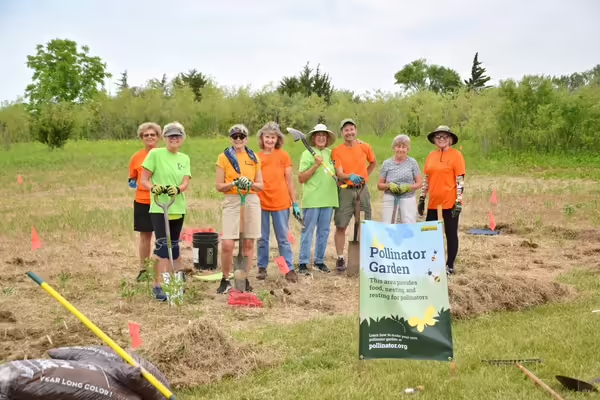
URBANA, Ill. — As they flutter through plant and flower blossoms, spreading pollen with every landing, butterflies, bees, and other pollinators quietly sustain healthy ecosystems, successful home vegetable gardens, and agricultural production. This Pollinator Week, June 16-22, University of Illinois Extension joins the national initiative to raise awareness about the vital role these insects play.
Pollinators move pollen from one flower to the next, fertilizing and producing fruits, nuts, and seeds. Some plants are self-pollinating or wind-pollinated, but many rely on insects such as butterflies, bees, beetles, moths, wasps, flies, or animals like hummingbirds.
More than 150 crops in the U.S. benefit from pollinators, which contribute to about one-third of the food we consume every day. Among these, 500 native bee species are some of the environment’s most valuable pollinators. Illinois Extension's Four Seasons Gardening webinar series invites viewers to learn more about native bees during pollinator week at go.illinois.edu/FourSeasonsGardening.
Many pollinator species populations are in decline from a loss of food sources and nesting habitats. Anyone can support pollinators by growing flowers that bloom from spring to fall, using integrated pest management practices that reduce or eliminate pesticide use, and limiting fall garden cleanup of fallen leaves and dead plant stems. To help community members take action, Extension's Illinois Pollinators tool, available at go.illinois.edu/IllinoisPollinators, has expert recommendations on plants for pollinator gardens, plant design tips, community science opportunities, and more.
"People are looking to know more about pollinators and how to support their populations," said Nicole Flowers-Kimmerle, Extension horticulture educator. "By helping people help pollinators through growing native flowering plants everywhere from their backyard to roadsides, we hope to create more habitats across Illinois."
Extension Master Gardener and Master Naturalist volunteers support 172 gardens statewide that provide food and habitat for pollinators. These projects include the Open Gate Garden in Madison County with native plants and educational signage, the Danville Public Library pollinator pocket enhancing community green spaces, and the Idea Garden in Kane County, providing tools and tips for creating home pollinator gardens.
To further address this issue, Extension began tracking "pollinator pockets" in 2016. To date, nearly 600 of these small community-based gardens have been reported by Illinois residents and others nationwide through the Pollinator Pocket website, go.illinois.edu/PollinatorPocket. Anyone can create and register a pollinator pocket garden.
"The incredible response from the community shows how individual actions can add to the larger effort to support pollinators. Each of these registered gardens helps sustain a healthy environment for pollinators and people", said Horticulture Educator Ryan Pankau.
Pollinator Week honors pollinators and serves as a reminder to take meaningful action in the growing effort to support and protect nature's small but essential creatures. Whether attending a local event, creating pollinator pockets, or learning more, every effort contributes to a healthier, more biodiverse environment. A list of pollinator books for readers of all ages and more information about National Pollinator Week are available at publish.illinois.edu/PollinatorWeek. Find an Extension demonstration pollinator garden in your area at gardens.extension.illinois.edu.
Photo Caption: A pollinator plot project at Lakeland Park in Canton led by Illinois Extension staff and volunteers from Fulton, Mason, Peoria, and Tazewell counties.
University of Illinois Extension develops educational programs, extends knowledge, and builds partnerships to support people, communities, and their environments as part of the state's land-grant institution. Extension serves as the leading public outreach effort for University of Illinois Urbana-Champaign and the College of Agricultural, Consumer and Environmental Sciences in all 102 Illinois counties through a network of 27 multi-county units and over 700 staff statewide. Extension’s mission is responsive to eight strategic priorities — community, economy, environment, food and agriculture, health, partnerships, technology and discovery, and workforce excellence — that are served through six program areas — 4-H youth development, agriculture and agribusiness, community and economic development, family and consumer science, integrated health disparities, and natural resources, environment, and energy.